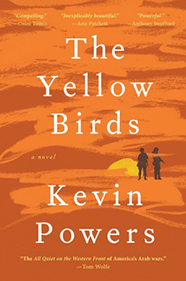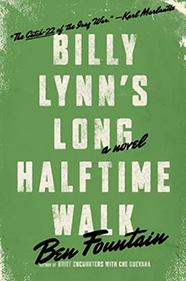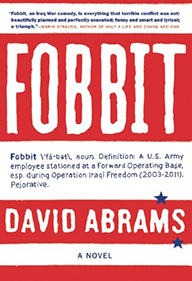by David Abrams
Buy on NOOK »The Pre-Tournament Play-In
The Yellow Birds v. Billy Lynn’s Long Halftime Walk v. Fobbit
Judged by Nathan Bradley
Welcome to the ninth annual Tournament of Books. Today’s match constitutes our pre-Tournament Play-In round. Below it, you’ll find color commentary from Kevin Guilfoile and John Warner, plus our comments section. Starting Thursday, a new judgment will go up each weekday morning through March until we reach the championship. If you’re new to the Tournament, check out the introduction that explains how things work. Enjoy!
It is apparently time to talk about Iraq, and in a fashion quite fitting to a war declared (and vehemently defended as) a victory from day one, these three Iraq war novels have been immediately praised as classics. While I am by no means an arbiter of that distinction, I’m an Army infantry officer who fought in Afghanistan. I also write fiction, some of which discusses the war. For war fiction to resonate with me, it has to have a minimum of pap and an honest, emotional core. Not too much to ask, right?
You might be surprised. I started with The Yellow Birds. Kevin Powers served in Iraq in 2004 and later received an MFA in poetry from the University of Texas. Given Powers’s background, the book’s potential for keen insight created, at least for me, an expectation of the same.
Sadly, those expectations went unmet. The Yellow Birds is a slathering of wan clichés. It offers nothing new to the reader. Powers has written some powerful passages—a long rant about the heartbreaking wrongness of killing left me incredibly moved. But reading it and expecting an understanding of the Iraq war experience is like being served a Fabergé egg when you were promised a bacon, egg, and cheese. It’s mostly bleakness, and many of the truths are lies.
The Yellow Birds is the tale of two infantry privates: John Bartle (the narrator) and Daniel “Murph” Murphy, deployed to Nineveh Province, Iraq, in the depths of 2004 and 2005. Bartle has been in the Army for a few years, whereas Murph is a virginal, downy-cheeked 18, blemished only by a pimple on his chin. Their immediate supervisor is a tough sergeant named Sterling, who isn’t afraid to dole out half-baked truths of war-zone life: “People are going to die. It’s statistics.”
Bartle survives the war, and in the drunken listlessness of his safe return from combat he struggles with a promise he couldn’t keep: During a family visit prior to his deployment, Private Murphy’s haggard Appalachian mother cornered Bartle and squeezed from him that most ironically deadly of war clichés:
“Nothing’s gonna happen to him, right? Promise that you’ll bring him home to me.”
“I promise,” I said. “I promise I’ll bring him home to you.”
So, there you have it: the grizzled sergeant, the tender young lamb upon war’s altar, the shattered seer, the promise made to Mama. There are no other significant characters in the story. During a major operation, something bad happens. Bartle struggles to reenter society upon his release from the military, and we discover the bad thing that happened. Someone has to pay. Bleakness reigns, and will again. That’s it.
I wish this were just sour grapes on my part, but when your savaged, knowing narrator offers wisdom like, “I felt like I was looking at a lie. But I didn’t mind. The world makes liars of us all.” Or perhaps: “Now I know: all pain is the same. Only the details are different.” Or perhaps: “But I remember being told the truth does not depend on being believed,” you have to wonder whether this is another attempt to declare victory, then forget about it. Powers misdirects his talent by exploring new frontiers of adjectives describing the hues of dust and light in lines like, “The birds circled above in the ruddy mackerel sky, where they made an artless semaphore.” But Tom Wolfe compared this book to All Quiet on the Western Front. I would instead compare it to Frank Nappi’s Echoes From the Infantry—finely written, limp, and best read using a library card.
David Abrams chose to take a different route: Fobbit is intended as comedy. I say “intended” because it’s not very funny, but rather cloying and over-long. His novel received praise for its simultaneous renderings of horror and humor, a pickles-and-ice-cream pairing all too familiar to those who have spent time in combat zones. I found its serious passages to be poignant and compelling, but its humorous passages eminently boring.
The novel centers on a small cadre of characters, the most likeable of whom is Staff Sgt. Chance Gooding, Jr., a consummate “fobbit.” That is to say a soldier never obligated to leave the Forward Operating Base, or FOB. FOB plus “hobbit.” You get it.
Gooding works in the Public Affairs Office of a fictional Army division deployed to Baghdad in 2005 (this is a thin fictionalization of Abrams’s own experience there in the same year). He’s a military flack who can’t send a timely press release to save his life—“the fobbitiest” of all division soldiers holed up in one of Saddam’s former palaces. The war hums briskly outside the wire, and from time to time a mortar or rocket lands within the fobbits’ sanctum. Their war is a futile and claustrophobic fixed loop, a 365-day reel of 12-hour shifts at a computer desk and dining facilities laden with comfort food. It is not the actual war.
For example, early in the novel, Gooding finds himself arguing with two junior-enlisted personnel clerks about confirming an American soldier’s death. The soldier has died in fiery horror, but Gooding can’t issue a press release until he gets confirmation from the Army doctors. Unfortunately, the server is down:
Semple leveled a flat gaze at Gooding and clicked at his equally dead in-box.
“He ain’t officially dead yet.”
“What about unofficially?”
“Unofficially, yeah. He’s road meat. But if anyone asks, you didn’t hear it from me.”
Here’s the problem: I’m that “road meat.” My soldiers were that “road meat.” I don’t really give a damn about Abrams’s Byzantine office drama. Tell me a story.
At first, I really enjoyed the book. I thought Abrams’s narrative was honest and unpretentious, a breath of fresh air after The Yellow Birds. It made me want to read some of his short, non-satirical fiction. The problem is that it just goes on and on. I cannot see how anyone unfamiliar with the military could muster the enthusiasm to finish it, unless from purest anthropological curiosity. It becomes clear that Abrams intends this book to have a moral voice in lines like:
The men who launched the mortar couldn’t have cared less about parabolas or direct hits, it didn’t matter one way or another to them if the mortar struck cobblestone or skull, as long as the end result brought maximum death and damage and bought them another day’s headline. The men with their goat-meat breath and tongue-tangling supplications to Allah cared only about quickly setting up the tripod and firing tube from the back of a Toyota pickup truck in some quite out-of-the-way neighborhood and launching with hasty aim.
It falls flat. Fobbit wants so badly to imitate Joseph Heller’s Catch-22 that it even name-checks the book. That’s right—while on R&R in Qatar, Staff Sgt. Gooding is spotted reading Heller’s famous novel, and is effectively accused of being anti-American by a hapless, worthless captain who is later described as “the worst officer in the United States Army.” We aren’t allowed to figure it out ourselves.
Catch-22 was a profoundly anti-war statement in an era fattened on self-congratulation, and it referenced a conflict of which just about all of its adult readers had a relevant experience or memory. Whereas the actual day-to-day fighting in the Iraq war was the purview of a small percentage of forces even deployed there; for those unaffiliated, it may as well have never happened. Abrams offers us the voice of a slapdash court troubadour alternatively cracking wise about and then mourning the fate of the “road meat.” But I want to know what the “road meat” thought, what they felt and feared when, limbs still attached, eyes still bright, they were deployed to a country gone unhinged and blood-crazed. Neither Fobbit nor The Yellow Birds does so.
Which brings us to Billy Lynn’s Long Halftime Walk, an Iraq novel written by a civilian and set in the United States. Ben Fountain’s story concerns the titular Billy Lynn—another virginal teenage infantry private—who, along with members of his squad, has returned to the United States to be honored for battlefield valor. The scene is a Dallas Cowboys game on Thanksgiving Day, 2004. An unenviable time to be deployed to Iraq, or in the Army for that matter.
The Army has brought Billy Lynn and his squad to the United States on what’s being called a “Victory Tour,” and described as:
One nation, two weeks, eight American heroes, though technically there is no such thing as Bravo squad. They are Bravo Company, second platoon, first squad, said squad being comprised of teams alpha and bravo, but the Fox embed christened them Bravo squad and thus they were presented to the world.
The Bravos are a ragged and proud few. Their presence inspires a tearful, martial ferocity in civilians, and Fountain often depicts the conversations as mere clouds of buzzwords and local color, words like “freedom” and “pride” and “Eye-rack,” words that float unnoticed past the dazed soldiers only days away from returning to the combat zone that has already claimed one of their friends. They get drunk, they laugh, they cavort with strippers, they squabble, they talk in profanity-laced soldier hyperbole, they threaten to do each other’s mothers and sisters. In short, they talk like actual infantrymen. As an observer puts it:
What cards these Bravos are, what a grab-ass band of brothers. Okay, so maybe they aren’t the greatest generation by anyone’s standard, but they are surely the best of the bottom third percentile of their own somewhat muddled and suspect generation.
The Bravos are to stand tall in their dress uniforms during a halftime performance by Destiny’s Child. The entirety of the novel concerns this day’s events and the imminence of the soldiers’ return to Iraq, and within it the petty indignities and quiet observations made by Billy, who has far more in common with Tim O’Brien’s Paul Berlin than any other character in these three books. Billy is young and searching for meaning in the pattern-less inferno of Iraq, and his flashes of illumination have all the earnestness and yearning of a kid still adolescent, still growing into his body as he’s bedecked by all the pride and projections of a disconnected civilian world. Fountain’s narration doesn’t shy from judgment, but it feels far more natural than both Powers’s and Abrams’s.
I found Billy Lynn a pleasure to read. It was the only book of the three that I enjoyed. I found myself smiling or laughing or shaking my head and saying “goddamn” because I felt like Fountain nailed it. His depictions of soldier circumstances and interactions are spot-on, which leads me to believe that he found some actual infantry combat veterans and talked to them. He did his homework.
But Billy Lynn is not perfect. There are times when the narrative seems to smirk rather than simply speak. There are things that have rubbed conservative readers the wrong way: that the bulbous Texans and effusively patriotic rich folks are portrayed as gasbag self-parodies, or that the soldiers do and say bad things (like smoke a joint with a stadium employee, or get in scuffles with patrons, or get in a fight with the Destiny’s Child roadies). I find it hard to believe that, even in the aftermath of a hellish firefight, an infantry squad leader would kiss one of his soldiers square on the lips (this happens in the book). The whole thing could have been shorter. And it would be a great shame if the author’s often naked partisanship alienates some readers—not that I disagree with it, but rather that some Americans are still so tearfully committed to the notion that we were always winning in Iraq, even when it comes to picking books for their local libraries.
But Fountain’s novel is far more true to the Army I know (and the soldiers within it) than anything I’ve yet read. To take offense to its assertions that not all soldiers are guileless Boy Scouts is self-deception. Sorry, it’s true. And here’s something else that’s true: Billy finds himself talking to a gang of reporters, who he says are:
…such a sad-fuck sampling of civilian bio-matter that for a moment Billy is actually glad for the war, hell yes, so much better to be out there shooting guns and blowing shit up than shuffling around like scenery on a bad sitcom. God knows that war sucks, but he sees no great appeal in these tepid peacetime lives.
For better or worse, I’ve been there. That’s what we within the ranks of the “road meat” feel upon coming back to the real world and staring at the stacks of blank calendars representing the rest of our lives. It’s a horrible, poisonous feeling—it’s an endorsement of war, of something so purely and undeniably wrong—but it’s real. Fountain got it right, along with many other details, and for that he deserves accolades.
I can’t comment on whether Billy Lynn will be regarded as a timeless classic, but it’s the best book of the three by leaps and bounds.
Match Commentary
By Kevin Guilfoile & John Warner
John: Number nine, number nine, number nine. This is the ninth year of the Tournament of Books. Not to brag, but that’s one more year than Radiohead has albums. Welcome back, everybody.
I say this every year, but I continue to be amazed by the reception our yearly experiment receives. We can definitively say that this year’s tournament is bigger than ever due to the appearance of our presenting sponsor, NOOK® by Barnes & Noble, and today’s play-in round, which swells the ranks of contenders to 18 from our traditional 16. We’ve turned over the judging ranks entirely from a year ago and retained the fan-favorite Zombie Round voting, which we won’t disclose until later in the tourney, but involved some of the closest results in the Tournament’s history.
We say this often, but it’s the audience participation that makes the Tournament, and after exploding in our comments sections the past several years, I’m pleased to notice that Book Riot is now playing ESPN to our March Madness with their series of discussions and handicapping of the matchups.
As the engine fires on the greatest book-related spectacle on the internet, I’m ready for the slings and arrows and bouquets about to be thrown our way.
Speaking of arrows, we came in for a little criticism at Book Riot for the seemingly arbitrary nature of today’s play-in.
Kevin: John, it was probably unfair to take three acclaimed novels about the Iraq and Afghanistan wars and force them into their own pre-tournament Hunger Games round for a spot in the ToB. Who am I kidding, it was definitely unfair. But it does not feel accidental that post-9/11 war stories—these novels certainly, but also Hurt Locker and Homeland and Zero Dark Thirty—are starting to resonate now. It’s almost as if this year, finally, just enough space was put between the worst of those wars—and our anxiety over them—and the present for us to digest them through fiction. It’s certainly an irony that we find it more difficult to process reality-based fiction at the time when we most need perspective on the events they describe, but these are our limitations as humans and readers.
I wonder if a similar kind of authorial daylight between civilian Ben Fountain and his soldier subjects is what also makes Billy Flynn more realistic to Judge Bradley. I’m not sure it’s always an advantage to write what you know. You need to describe events and people accurately, but you also need objective perspective on those events. It’s why we don’t have John Boehner reporting on the House of Representatives for the Washington Post, right?
John: Fairness has never exactly been our guiding light. I appreciate that our followers and supporters seem to feel that our yearly exercise is an effort at finding truth and dispensing justice, but what it instead exposes is that there are no such things as truth and justice, at least in regard to book awards, which are inherently and inevitably arbitrary, kind of like NBC’s treatment of its half-hour comedies.
But it sure is fun!
I think you’re right that we’ve perhaps reached a space where books about our most recent wars can find purchase. We actually may be a bit early in the usual lifecycle of these things. Catch-22 was published in 1961, Slaughterhouse-Five in 1969. We haven’t seen the last word on these wars, I’m sure. The Things They Carried (1990) came almost 20 years after Tim O’Brien’s service. The terrific Matterhorn (2010) by Karl Marlantes took 30 years for him to write.
We have three highly praised books here, but I’d hate to think that, as Judge Bradley says, we’re declaring “victory” and going home when it comes to fiction born out of these wars.
Kevin: Fountain is a terrific writer and, as Judge Bradley notes, a great reporter. There were times, in fact, where I was so convinced Billy was real that I forgot that this was really a comic novel at its heart. There is a scene (bit of a spoiler here) in which Billy gives a Dallas Cowboys cheerleader an orgasm after just a few furtive seconds of dry humping behind a divider in a crowded room. And for a while (I think I even discussed it with you at the time) I thought it was a rare misstep in the book. On the surface, it felt like a pretty egregious case of male wish fulfillment, especially considering that she’s virtually the only female character in the novel. This book would fail the Bechdel test more times than Honey Boo Boo would fail the California Bar.
But the book didn’t leave me quickly and as I thought more about it, another picture came into focus for me. To civilians these soldiers are symbols of power. Specifically American power. And so these kids are fawned over (and alienated) by the millionaires in the Texas Stadium suites because these men worship nothing more than power. And it makes perfect sense that when the ultimate symbol of American power meets the ultimate symbol of American sexuality you get what Bobby Brady once described, after kissing a young (and possibly contagious) Melissa Sue Anderson, as “skyrockets.”
Which is all just to say that I take it back.
John: I’ve read both Billy Lynn’s and Fobbit, and sampled enough of The Yellow Birds to, I think, get its vibe and know it’s not for me. The Yellow Birds is one of those books where I understand why other people like it, but those virtues that are very real for them are illusory to me, and no amount of wishing differently is going to make it true.
I thought Fobbit was a very successful satire, much more so than Judge Bradley. I laughed quite a bit. Some of this may be rooted in my lack of familiarity with the ways of the military, and the things that Abrams exposes read fresher to my eye than someone like Judge Bradley, who is already well-acquainted with these ironies.
All this is to say that I stand in agreement with this judgment. Billy Lynn’s was one of my top five reads of the year. It’s as funny as Fobbit, and also managed to get me more than a little emotionally involved with Billy and the rest of the crew.
I think the secret to its success is indeed in Fountain’s stance as reporter. It seems to me that the most enduring war fictions—like Catch-22 and The Things They Carried—are forced to create their own idioms unique to worlds the books are birthed from. Heller’s creation turned the widely held notions of war heroism upside down. The Things They Carried uses a metafictional lens to show the impossibility of understanding war. O’Brien demonstrates that war is its own thing—a life force ungoverned and uncontrollable by man.
I think Billy Lynn’s is the only book of the three that seeks its own idioms. It tackles these wars on their own terms, where the vast majority of us have experienced them from extreme remove, where our patriotic duty was to go shopping, rather than enlist. Fountain takes on the jingoism. He removes the warriors from the war, which it seems to me is how most Americans like to think about things, probably to our shame, even more shame than elevating Kim Kardashian to the A-list.
Kevin: So now the final 16 have been set and the Tournament proper can begin properly. Look for the first match on Thursday. (We’ve decided to delay it a bit so that the word can get out and everyone can reach their seats, as it were.)
Thursday’s matchup will be Louise Erdrich’s National Book Award-winning The Round House versus John Green’s YA blockbuster The Fault in Our Stars. It would probably be tempting to say that this is one of those “literature vs. genre” or “highbrow vs. middlebrow” matchups, except that Green’s book was also one of the most critically acclaimed of the year, having been named, just for instance, book of the year by Time magazine. Indeed, I can’t remember the last time a young adult novel received this much love from the literary media. You might have to go back to a time when “young adult novels” were properly called just “novels.”
Let the feathers fly!

























